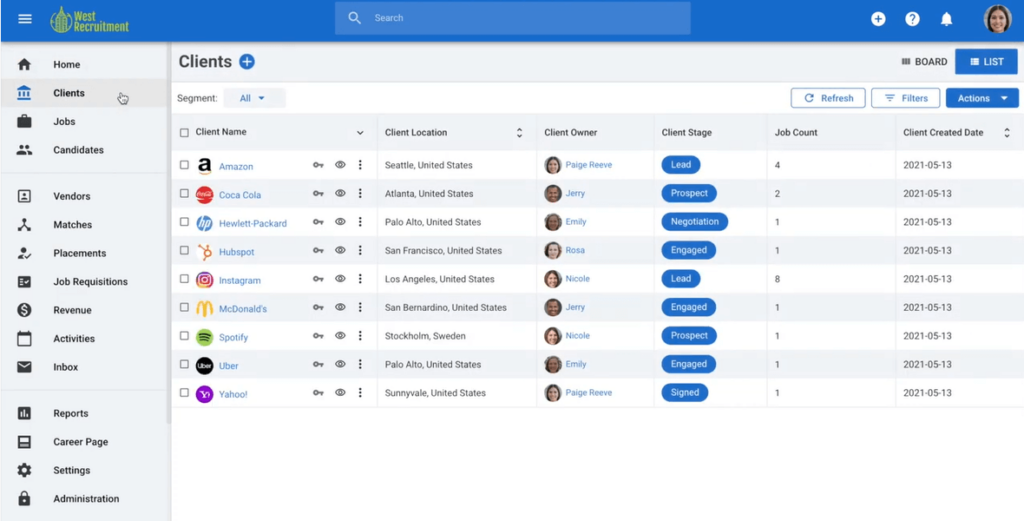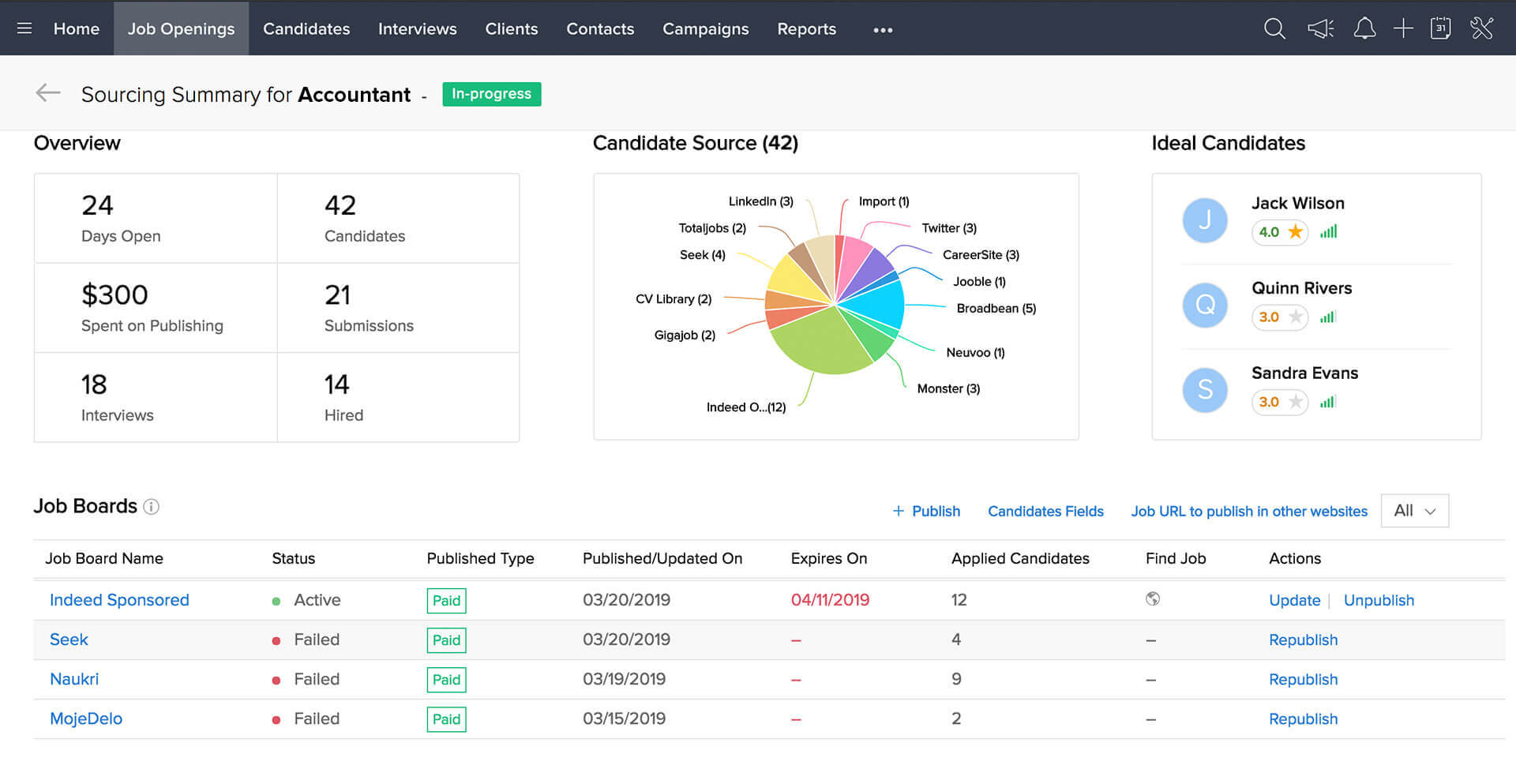Introducing the CRM system for recruitment, an innovative solution designed to streamline your hiring process and empower your recruitment team. Dive into the world of enhanced candidate management, seamless communication, and data-driven decision-making.
Harnessing the power of a CRM system, recruiters can now organize their workflow, track progress, and leverage valuable insights to make informed decisions. Discover the myriad of benefits and transformative potential that a CRM system holds for your recruitment strategy.
Features of a CRM System for Recruitment

A CRM (Customer Relationship Management) system tailored for recruitment streamlines and enhances the entire hiring process. It provides a centralized platform to manage candidate data, track interactions, and automate workflows, enabling recruiters to efficiently attract, qualify, and hire top talent.
Key Modules and Functions
Essential modules within a recruitment CRM include:
- Candidate Management:Stores and organizes candidate profiles, including resumes, contact information, and interview notes.
- Job Posting and Tracking:Facilitates the creation and distribution of job openings across multiple channels, tracking applicant submissions.
- Sourcing and Screening:Integrates with job boards and social media platforms to identify and screen potential candidates.
- Interview Scheduling:Automates the scheduling and coordination of interviews, sending reminders and confirmations.
- Collaboration and Communication:Provides a platform for recruiters to collaborate, share candidate feedback, and communicate with candidates and hiring managers.
Benefits of Using a CRM for Recruitment
Leveraging a CRM system for recruitment offers numerous advantages:
- Improved Candidate Experience:Streamlines the application and interview process, providing candidates with a positive and efficient experience.
- Increased Efficiency:Automates repetitive tasks, freeing up recruiters’ time to focus on strategic initiatives.
- Enhanced Collaboration:Facilitates seamless communication and coordination among team members, ensuring a consistent hiring process.
- Data-Driven Insights:Provides real-time data and analytics to track recruitment metrics, identify bottlenecks, and make informed decisions.
- Improved Candidate Quality:Helps recruiters identify and attract top talent through targeted sourcing and screening capabilities.
Benefits of Using a CRM System for Recruitment
Incorporating a CRM system into your recruitment process offers numerous advantages, enhancing candidate management, streamlining communication, and fostering collaboration.
Improved Candidate Management
A CRM system provides a centralized platform for managing candidate information, tracking their progress through the recruitment pipeline, and automating tasks such as scheduling interviews and sending follow-up emails. This streamlines the process, reduces manual errors, and ensures that every candidate receives personalized attention.
Streamlined Communication
CRM systems facilitate seamless communication between recruiters and candidates. They provide a shared platform for exchanging messages, sharing documents, and scheduling appointments. This eliminates the need for multiple email threads and phone calls, improving efficiency and keeping everyone on the same page.
Enhanced Collaboration
CRM systems foster collaboration among team members by providing a shared workspace where they can share notes, track candidate progress, and assign tasks. This enables recruiters to work together effectively, leverage each other’s expertise, and make informed decisions.
Data-Driven Decisions
CRM systems collect valuable data on candidate interactions, recruitment metrics, and candidate demographics. This data can be analyzed to identify trends, optimize recruitment strategies, and make data-driven decisions. By leveraging this information, recruiters can improve the quality of their hires and increase their overall recruitment efficiency.
Case Studies
Numerous studies have demonstrated the positive impact of CRM systems on recruitment outcomes. For instance, a study by the Aberdeen Group found that companies using CRM systems for recruitment experienced a 15% increase in hiring success rates.
Improved Organization and Tracking
CRM systems help recruiters stay organized by providing a central repository for all candidate-related information. They also enable recruiters to track the progress of each candidate through the recruitment process, ensuring that no one falls through the cracks.
Implementation of a CRM System for Recruitment

Implementing a CRM system for recruitment involves several key steps:
Planning:This phase includes defining the goals and objectives of the CRM system, identifying the key stakeholders, and developing a project plan.
Configuration
Once the planning phase is complete, the CRM system can be configured to meet the specific needs of the organization. This includes setting up user roles and permissions, customizing workflows, and integrating with other systems.
Data Migration
Data migration is the process of transferring existing data from the old system to the new CRM system. This can be a complex and time-consuming process, so it is important to plan carefully.
Timeline and Resources
The timeline for implementing a CRM system for recruitment will vary depending on the size and complexity of the organization. However, it is typically a multi-month process.
The resources required for implementation will also vary, but will typically include a project manager, a technical team, and a team of end users.
Best Practices
There are a number of best practices that can help to ensure a smooth and successful implementation of a CRM system for recruitment.
- Get buy-in from all stakeholders.
- Develop a clear project plan.
- Use a phased approach to implementation.
- Train end users thoroughly.
- Monitor the system regularly and make adjustments as needed.
Integration with Other Systems

Integrating a CRM system with other HR and recruitment tools is crucial for enhancing its functionality and streamlining recruitment processes. This integration allows for seamless data flow and automated workflows, leading to improved efficiency and productivity.
Applicant tracking systems (ATS) are essential tools for managing candidate applications and tracking their progress through the recruitment process. By integrating a CRM system with an ATS, recruiters can easily import candidate data, update their status, and access their application history within the CRM.
This eliminates manual data entry and reduces the risk of errors, saving time and ensuring accuracy.
Social media platforms have become a valuable source for sourcing and engaging with potential candidates. Integrating a CRM system with social media platforms enables recruiters to monitor candidate activity, identify potential hires, and initiate conversations directly from the CRM. This integration helps recruiters expand their reach, engage with passive candidates, and build a strong talent pipeline.
Technical Considerations
Integrating a CRM system with other tools involves technical considerations such as data compatibility, security protocols, and API connectivity. It is important to ensure that the systems being integrated use compatible data formats and protocols to facilitate seamless data exchange.
Additionally, robust security measures must be in place to protect sensitive candidate data during integration and data transfer.
Challenges
Integration challenges may arise due to differences in data structures, data formats, and communication protocols between the systems being integrated. Resolving these challenges requires careful planning, technical expertise, and collaboration between the IT team and the recruitment team. Proper testing and validation are also essential to ensure that the integrated systems function as intended.
Customization and Reporting: Crm System For Recruitment
CRM systems for recruitment offer a range of customization options, allowing organizations to tailor the system to their specific needs and processes. This customization enhances user experience, optimizes workflows, and improves overall recruitment efficiency.
Customization Options
- Fields and Modules:Organizations can create custom fields and modules to capture and track data specific to their recruitment processes, such as candidate skills, experience, or internal job requisition details.
- Workflows:Customizable workflows automate tasks and streamline processes, such as candidate screening, interview scheduling, and offer management.
- User Interface:The user interface can be customized to match the organization’s branding and preferences, making it more user-friendly and intuitive for recruiters.
Reporting Capabilities, Crm system for recruitment
CRM systems provide robust reporting capabilities, enabling organizations to track and measure the effectiveness of their recruitment efforts. These reports offer insights into key metrics such as:
- Time-to-fill
- Candidate quality
- Recruitment costs
- Candidate experience
By analyzing these reports, organizations can identify areas for improvement and make data-driven decisions to enhance their recruitment strategies.
Final Wrap-Up

In conclusion, the implementation of a CRM system for recruitment is a strategic investment that can revolutionize your hiring process. By embracing this technology, you empower your team with the tools they need to attract, engage, and hire top talent.
Embrace the future of recruitment and unlock the full potential of your organization’s hiring strategy.